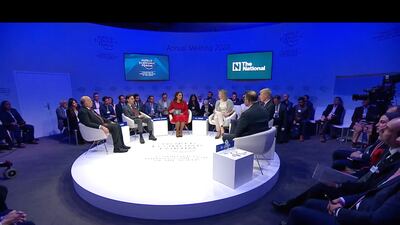A rare occurrence in this year’s annual meeting of the World Economic Forum: cautious optimism about the Middle East.
Participants are often positive about major economies such as Saudi Arabia and the UAE, yet the big picture is usually a concerning one.
There are no rose-tinted glasses. Several countries in the region suffer from conflict, such as Palestine, Syria, Libya and Yemen, others such as Lebanon face political dysfunction, and economic troubles are impacting the likes of Egypt.
Yet, undoubtedly, there is a reduced level of violence and regional tension that leads to a sense of optimism. It happens to coincide with a reduced American presence – in Davos and the Middle East.
Cautious optimism was the main message in a number of sessions, including one entitled “Middle East: Battleground or Meeting Point”.
While the Minister of Finance for Jordan, Mohamed Al-Ississ, warned of a “hope deficit”, he did remark that there was a chance to build on the regional momentum of co-operation that several countries have developed together.
Saudi Foreign Minister Prince Faisal bin Farhan Al Saud echoed the sentiment, saying: “I am optimistic” and stressing the dynamic of a “can-do” attitude in the region. He also floated the possibility of a resolution of the Yemen war through a negotiated settlement. The resolution of a conflict that has brought so much suffering would indeed spark major hope in Yemen itself and the region.
UN special envoy for Yemen Hans Grundberg was also present, being careful not to give false hope but stating that an extension of the truce and “building step by step” towards a lasting peace was possible.
Several senior Arab officials were present in Davos, speaking of solutions, and possibilities of regional integration, in a way that has not been seen for some years.
On a panel entitled “Arab Economies Converging”, Jordan Prime Minister Bisher Al Khasawneh spoke of the numerous regional projects, including some with Iraq and Egypt, that can create the nucleus for longer-term convergence.
Iraq’s President Abdul Latif Rashid held several bilateral meetings, stressing his country was open for business. He also noted on a panel that the region could do well without foreign intervention.
Regional collaboration, attracting foreign direct investment and securing long-term planning are all difficult tasks that require commitment and continued agreement between the various actors at play.
Most participants from the region agreed that the momentum developing in the Middle East is fragile and nascent. As futurist Amy Webb said in a session on “strategic forecasting”, future preparedness is crucial to long-term success.
Long-term regional co-operation is still some way off. From climate change to generative AI, the world is changing, and the Middle East must develop its own domestic capabilities to keep up with global developments and meet local needs.





























































